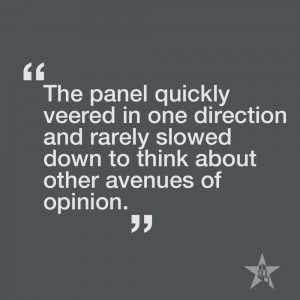By Christian Welker
I love to debate, sitting down with somebody who truly believes something I disagree with. I have spent hours sitting with friends, family, and even strangers on the internet, debating on all topics, from politics to religion, to what would happen if Time Travel was a reality.
However, it seems that as time passes, a debate has become less about exchanging ideas and more about beating your opponent in a shouting match. The “winners” of these debates are the people with a louder voice or more followers on their social media. This, combined with the echo chambers social media builds, which constantly feed people their opinions and views while blocking out alternative ones, makes it nearly impossible to share your idea without an argument and somebody feeling hurt at the end of the conversation. It seems we have lost the ability to debate.
The added tragedy to this loss is Christianity builds an echo chamber around itself and makes it difficult, if not impossible, to effectively show the light of Christ to the people around us. Nobody is going to believe that God is love if the way they are being told is by a man screaming in their face about sin and evolution.
I believe there are two leading causes of this new idea of debate. First are the social media echo-chambers that I mentioned before. These constantly affirm that your beliefs are correct while connecting other aspects of your life to them and making you see these opinions as your identity. The second is the idea that all debates need to have a loser. We defend our positions vehemently because we are afraid if we do not, the other side will “win the debate,” making our opinion, our view, and our identity wrong and, therefore, inferior.
This view is dangerous for several reasons. It pushes us apart from family, friends, and classmates who may have different opinions than us. We become convinced that those people are bad because they don’t share the same view that we do and we don’t want to associate with who we view as a “bad person.” We break away from them and find more people who agree with us on everything, going deeper into the echo chamber and making it even harder to hold a conversation with someone we view as different than us. In this process, it also becomes more likely that we become more extreme in our beliefs, vilifying those who disagree with us and eventually going so far as to view them as sub-human. These people become “heartless” or “too stupid to get it,” clear dividing lines are drawn, and crossing those lines becomes a traitorous act.
So what do we do? How can we break ourselves out of our echo chambers and connect with those we’ve begun to see as less than ourselves? Over the summer, while working at a Christian Bookstore, a coworker would always tell me to “Remember their hearts,” to remember that the other side is just as much of a human as you are. They don’t believe what they believe because they are evil or idiotic. They have just as much heart as you do, as much love, compassion, and care for others. Pastor Wes Oden at Houghton Wesleyan Church said during a recent sermon, “When we look at someone, we need to remember, they are a child of God, made in His image.” Being a child of God does not rely on being Republican or Democrat, Pro-Choice or Pro-Life, LGBTQ or Straight. Everyone is a child of God, no matter what. So remembering that is the first step to being able to communicate with the other side.
We also need to break out of our echo chambers and remember that these views don’t encapsulate everything we are. Go to subreddits or Instagram profiles with different opinions than you, talk to someone who disagrees with your beliefs, don’t argue, listen. Everyone has a reason for seeing the world as they do, and if we know why they think that way, their beliefs will likely become less foreign to us. Thoughts also grow and change over time. Therefore, believing that you’d lose yourself if you alter your beliefs or become friends with someone who disagrees does not make much sense. Debates can be used as an opportunity to grow your opinions and views of the world in a calm environment, as long as both parties are willing to discuss it with you with clear heads and level emotions.
Viewing a debate as an exchange of ideas instead of a fight for survival, removing yourself from echo chambers that make it hard to hear alternate opinions, and viewing the person you are talking to as a human being and a child of God instead of a heartless monster are ways that we as people can grow. We will grow our connections between people, our knowledge on the subject, and our own opinions and beliefs. While getting angry can seem inevitable, we can choose what to do with that anger, whether we lash out at our “opponent” or calm ourselves down to continue the conversation with our friend, family member, or classmate. Debating calmly and kindly will help shape your own mind and opinions and allow you to grow as a person. ★

